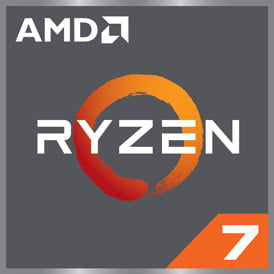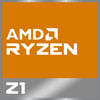
Microsoft XBox Series S Benchmark, Test and specs
Last updated:
The Microsoft XBox Series S was released in Q3/2020 and has 8 cores. The processor can process 16 threads simultaneously and uses a mainboard with the socket BGA. In the Geekbench 5 benchmark, the Microsoft XBox Series S achieved a result of 1,015 points (single-core) or 6,824 points (multi-core).

| Name: | Microsoft XBox Series S |
|---|---|
| Family: | AMD Ryzen 7 (67) |
| CPU group: | AMD Ryzen 4000G (22) |
| Architecture: | Renoir (Zen 2) |
| Segment: | Desktop / Server |
| Generation: | 3 |
| Predecessor: | -- |
| Successor: | -- |
CPU Cores and Base Frequency
The Microsoft XBox Series S has 8 cores. The clock frequency of the Microsoft XBox Series S is 3.00 GHz (3.60 GHz). An initial performance assessment can be made using the number of CPU cores.
| CPU Cores / Threads: | 8 / 16 |
|---|---|
| Core architecture: | normal |
| Cores: | 8x Zen 2 |
| Hyperthreading / SMT: | Yes |
|---|---|
| Overclocking: | No |
| Frequency: | 3.00 GHz |
| Turbo Frequency (1 Core): | 3.60 GHz |
| Turbo Frequency (8 Cores): | 3.40 GHz |
Internal Graphics
The Microsoft XBox Series S has an integrated graphics that the system can use to efficiently play back videos. The Microsoft XBox Series S has the AMD Custom Radeon Graphics (XBox Series S) installed, which has 20 streaming multiprocessors (1280 shaders).
| GPU name: | AMD Custom Radeon Graphics (XBox Series S) |
|---|---|
| GPU frequency: | 1.57 GHz |
| GPU (Turbo): | No turbo |
| Compute units: | 20 |
| Shader: | 1280 |
| Hardware Raytracing: | No |
| Release date: | Q3/2021 |
| Max. displays: | 1 |
|---|---|
| Generation: | 1 |
| Direct X: | 12 |
| Technology: | 7 nm |
| Max. GPU Memory: | 8 GB |
| Frame Generation: | No |
Hardware codec support
Processors with integrated graphics can process video codecs faster. Support for modern codecs can significantly increase system efficiency during video playback.
| h265 / HEVC (8 bit): | Decode / Encode |
|---|---|
| h265 / HEVC (10 bit): | Decode / Encode |
| h264: | Decode / Encode |
| VP8: | Decode / Encode |
| VP9: | Decode / Encode |
| AV1: | No |
|---|---|
| AVC: | Decode / Encode |
| VC-1: | Decode |
| JPEG: | Decode / Encode |
Memory & PCIeThe Microsoft XBox Series S supports a maximum of 10 GB memory. Depending on the mainboard, the processor can use a maximum of 2 (Dual Channel) memory channels. This results in a maximum bandwidth of the main memory of 224.0 GB/s. |
|
| Memory type: | Memory bandwidth: |
|---|---|
| GDDR6 | 224.0 GB/s |
| Max. Memory: | 10 GB |
| Memory channels: | 2 (Dual Channel) |
| ECC: | No |
| PCIe: | 4.0 x 12 |
| PCIe Bandwidth: | 23.6 GB/s |
Thermal ManagementThe Microsoft XBox Series S has a TDP of 65 W. Based on the TDP, the system manufacturer can and must adapt the cooling solution to the processor. |
|
|---|---|
| TDP (PL1 / PBP): | 65 W |
| TDP (PL2): | -- |
| TDP up: | -- |
| TDP down: | -- |
| Tjunction max.: | 100 °C |
Technical details
Modern production reduces the waste heat of a processor and increases its efficiency. The Microsoft XBox Series S is made in 7 nm and has 8.00 MB cache.
| Technology: | 7 nm |
|---|---|
| Chip design: | Monolithic |
| Socket: | BGA |
| L2-Cache: | -- |
| L3-Cache: | 8.00 MB |
| AES-NI: | Yes |
| Operating systems: | Windows 10, Windows 11, Linux |
| Virtualization: | AMD-V, SVM |
|---|---|
| Instruction set (ISA): | x86-64 (64 bit) |
| ISA extensions: | SSE4a, SSE4.1, SSE4.2, AVX2, FMA3 |
| Release date: | Q3/2020 |
| Release price: | -- |
| Part Number: | -- |
| Documents: | -- |
Rate this processor
Benchmark results

The benchmark results for the Microsoft XBox Series S have been carefully checked by us. We only publish benchmark results that have been created by us or that have been submitted by a visitor and then checked by a team member. All results are based on and fullfill our benchmark guidelines.
Cinebench R23 (Single-Core)
Cinebench R23 is the successor of Cinebench R20 and is also based on the Cinema 4 Suite. Cinema 4 is a worldwide used software to create 3D forms. The single-core test only uses one CPU core, the amount of cores or hyperthreading ability doesn't count.

|
Intel Core i5-1035G4
4C 8T @ 3.70 GHz |
||

|
Intel Core i5-1035G7
4C 8T @ 3.70 GHz |
||

|
Intel Core i7-6950X
10C 20T @ 3.50 GHz |
||
|
|
Microsoft XBox Series S
8C 16T @ 3.60 GHz |
||

|
Intel Core i5-10500
6C 12T @ 4.50 GHz |
||

|
Intel Core i5-8259U
4C 8T @ 3.80 GHz |
||

|
Intel Core i5-1034G1
4C 8T @ 3.60 GHz |
||
Cinebench R23 (Multi-Core)
Cinebench R23 is the successor of Cinebench R20 and is also based on the Cinema 4 Suite. Cinema 4 is a worldwide used software to create 3D forms. The multi-core test involves all CPU cores and taks a big advantage of hyperthreading.

|
AMD Ryzen 7 2700X
8C 16T @ 3.85 GHz |
||

|
AMD Ryzen 5 3600XT
6C 12T @ 4.50 GHz |
||

|
Intel Core i9-10980HK
8C 16T @ 3.40 GHz |
||
|
|
Microsoft XBox Series S
8C 16T @ 3.40 GHz |
||

|
AMD Ryzen 5 3600X
6C 12T @ 4.20 GHz |
||

|
Intel Core i7-1355U
10C 12T @ 1.70 GHz |
||

|
Sony Playstation 5
8C 16T @ 3.50 GHz |
||
Geekbench 5, 64bit (Single-Core)
Geekbench 5 is a cross plattform benchmark that heavily uses the systems memory. A fast memory will push the result a lot. The single-core test only uses one CPU core, the amount of cores or hyperthreading ability doesn't count.

|
Intel Xeon Gold 6128
6C 12T @ 3.70 GHz |
||

|
Intel Xeon E5-2637 v4
4C 8T @ 3.70 GHz |
||

|
Intel Xeon E3-1515M v5
4C 8T @ 3.70 GHz |
||
|
|
Microsoft XBox Series S
8C 16T @ 3.60 GHz |
||

|
Intel Xeon Gold 5218N
16C 32T @ 3.70 GHz |
||

|
Intel Core i7-7920HQ
4C 8T @ 4.10 GHz |
||

|
AMD EPYC 7542
32C 64T @ 3.40 GHz |
||
Geekbench 5, 64bit (Multi-Core)
Geekbench 5 is a cross plattform benchmark that heavily uses the systems memory. A fast memory will push the result a lot. The multi-core test involves all CPU cores and taks a big advantage of hyperthreading.

|
Intel Core i3-13100
4C 8T @ 4.10 GHz |
||

|
Intel Core i3-13100F
4C 8T @ 4.10 GHz |
||

|
Intel Xeon W-10855M
6C 12T @ 4.20 GHz |
||
|
|
Microsoft XBox Series S
8C 16T @ 3.40 GHz |
||

|
Intel Xeon E5-2640 v4
10C 20T @ 2.80 GHz |
||

|
AMD Ryzen 5 3600
6C 12T @ 4.00 GHz |
||

|
AMD Ryzen 7 5825C
8C 16T @ 2.80 GHz |
||
Cinebench R20 (Single-Core)
Cinebench R20 is the successor of Cinebench R15 and is also based on the Cinema 4 Suite. Cinema 4 is a worldwide used software to create 3D forms. The single-core test only uses one CPU core, the amount of cores or hyperthreading ability doesn't count.

|
AMD Ryzen Threadripper 1950X
16C 32T @ 4.00 GHz |
||

|
Intel Core i5-8400
6C 6T @ 4.00 GHz |
||

|
Intel Core i7-4790K
4C 8T @ 4.40 GHz |
||
|
|
Microsoft XBox Series S
8C 16T @ 3.60 GHz |
||

|
Intel Core i7-5930K
6C 12T @ 3.70 GHz |
||

|
Intel Core i3-10300T
4C 8T @ 3.90 GHz |
||

|
Intel Core i5-8600K
6C 6T @ 4.30 GHz |
||
Cinebench R20 (Multi-Core)
Cinebench R20 is the successor of Cinebench R15 and is also based on the Cinema 4 Suite. Cinema 4 is a worldwide used software to create 3D forms. The multi-core test involves all CPU cores and taks a big advantage of hyperthreading.

|
AMD Ryzen 7 4800H
8C 16T @ 3.80 GHz |
||

|
AMD Ryzen 7 4800HS
8C 16T @ 3.80 GHz |
||

|
AMD Ryzen 7 4800U
8C 16T @ 3.20 GHz |
||
|
|
Microsoft XBox Series S
8C 16T @ 3.40 GHz |
||

|
Intel Core i5-11260H
6C 12T @ 3.60 GHz |
||

|
AMD Ryzen 5 3600X
6C 12T @ 4.20 GHz |
||

|
Intel Core i5-11400H
6C 12T @ 3.70 GHz |
||
iGPU - FP32 Performance (Single-precision GFLOPS)
The theoretical computing performance of the internal graphics unit of the processor with simple accuracy (32 bit) in GFLOPS. GFLOPS indicates how many billion floating point operations the iGPU can perform per second.

|
AMD Ryzen 7 7840HS
AMD Radeon 780M @ 2.70 GHz |
||

|
AMD Ryzen 7 7840U
AMD Radeon 780M @ 2.70 GHz |
||

|
AMD Ryzen Z1 Extreme
AMD Radeon 780M @ 2.70 GHz |
||
|
|
Microsoft XBox Series S
AMD Custom Radeon Graphics (XBox Series S) @ 1.57 GHz |
||

|
Qualcomm Snapdragon X Plus (X1P-64-100)
Qualcomm Adreno X Elite/Plus @ 1.00 GHzNot verified |
||

|
Qualcomm Snapdragon X Elite (X1E-78-100)
Qualcomm Adreno X Elite/Plus @ 1.00 GHzNot verified |
||

|
Qualcomm Snapdragon X Elite (X1E-80-100)
Qualcomm Adreno X Elite/Plus @ 1.00 GHzNot verified |
||
Estimated results for PassMark CPU Mark
Some of the CPUs listed below have been benchmarked by CPU-monkey. However the majority of CPUs have not been tested and the results have been estimated by a CPU-monkey’s secret proprietary formula. As such they do not accurately reflect the actual Passmark CPU mark values and are not endorsed by PassMark Software Pty Ltd.

|
Intel Xeon E-2336
6C 12T @ 2.90 GHz |
||

|
Intel Xeon Gold 6134
8C 16T @ 3.50 GHz |
||

|
Intel Core i5-12400T
6C 12T @ 3.00 GHz |
||
|
|
Microsoft XBox Series S
8C 16T @ 3.40 GHz |
||

|
Intel Xeon Gold 5118
12C 24T @ 2.60 GHz |
||

|
Intel Xeon E5-2690 v3
12C 24T @ 3.00 GHz |
||

|
Intel Xeon E5-2695 v3
14C 28T @ 2.80 GHz |
||
Benchmarks

Cinebench R23 (SC)
586 entries
586 entries

Cinebench R23 (MC)
565 entries
565 entries

Geekbench 5 (SC)
2,488 entries
2,488 entries

Geekbench 5 (MC)
2,461 entries
2,461 entries

Cinebench R20 (SC)
656 entries
656 entries

Cinebench R20 (MC)
604 entries
604 entries

FP32 SP (iGPU)
2,042 entries
2,042 entries

PassMark CPU-Mark
2,392 entries
2,392 entries
Popular comparisons
back to index







